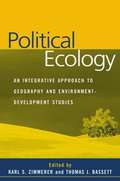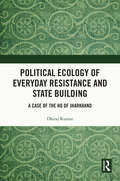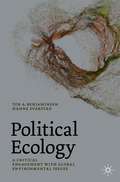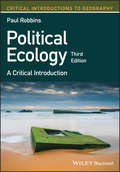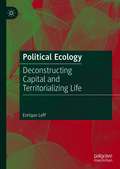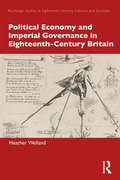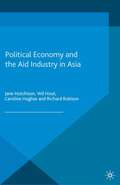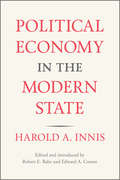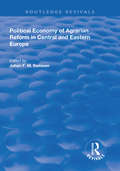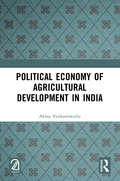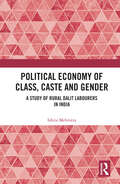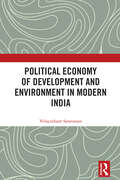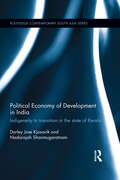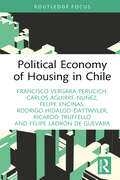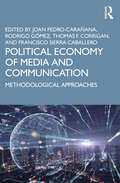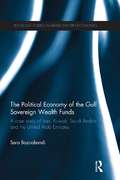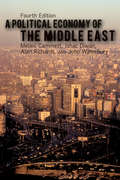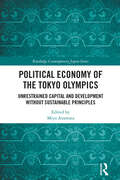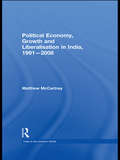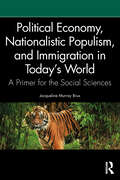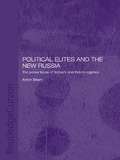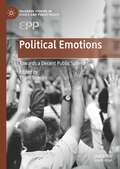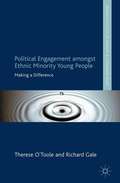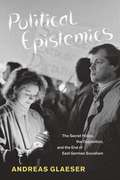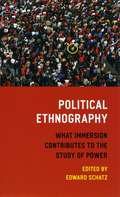- Table View
- List View
Political Ecology
by Karl Zimmerer Thomas J. BassettThis volume offers a unique, integrative perspective on the political and ecological processes shaping landscapes and resource use across the global North and South. Twelve carefully selected case studies demonstrate how contemporary geographical theories and methods can contribute to understanding key environment-and-development issues and working toward effective policies. Topics addressed include water and biodiversity resources, urban and national resource planning, scientific concepts of resource management, and ideas of nature and conservation in the context of globalization. Giving particular attention to evolving conceptions of nature-society interaction and geographical scale, an introduction and conclusion by the editors provide a clear analytical focus for the volume and summarize important developments and debates in the field.
Political Ecology of Everyday Resistance and State Building: A Case of the Ho of Jharkhand
by Dhiraj KumarResource extraction and conflicts over natural resources are a global phenomenon, including in India. This book explores the process of state formation through developmental intervention in the resource-rich areas of Jharkhand in eastern India which are inhabited by the indigenous Ho community. The cultural practices and livelihoods of Indigenous tribes, like the Ho community in Jharkhand, are deeply linked with the local ecology. The conflict in Jharkhand is intertwined with state development projects and capitalist interventions. This book examines the history of these projects and the issues of territorialisation, dispossession, accumulation, and marginalization which communities have been fighting against for many decades. It examines the process of development policies and projects shaping and restructuring the resource-rich ecology in the region and addresses the interrelated issues of development-induced dispossession, resistance, ecological transformation, governance, illegalities, and state-building. It focuses on the questions: what do development projects bring to the Ho community; what induces them to resist and negotiate; and how state decentralization schemes and local governance in resource conflict areas strengthen State capacities? The book highlights the consequences on the livelihoods and cultural practices of the local people because of ecological transformation and everyday resistance. Comprehensive and important, this book will be of interest to students and researchers of anthropology, sociology, political ecology, social work, development studies, ecology, developmental sociology, indigenous studies, law, and economic anthropology.
Political Ecology: A Critical Engagement with Global Environmental Issues
by Tor A. Benjaminsen Hanne SvarstadThis textbook introduces political ecology as an interdisciplinary approach to critically examine land and environmental issues. Drawing on discourse and narrative analysis, Marxist political economy and insights from natural science, the book points at similarities, differences and inter-connections between environmental governance in the global North and South. A wide range of carefully curated case studies are presented, with a particular focus on Africa and Norway. Key themes of power, justice and environmental sustainability run through all chapters. The authors challenge established views and leading discourses and present research findings that may surprise readers. Chapters cover topics including wildlife conservation, climate change and conflicts, land grabbing, the effects of population growth on the environment, jihadism in the African Sahel, bioprospecting, feminist political ecology, and struggles around carbon mitigation within a fossil fuel-based economy. This introductory text provides tools and examples for both undergraduate and postgraduate students to better understand on-going struggles about some of the world’s most urgent challenges.
Political Ecology: A Critical Introduction (Critical Introductions to Geography #16)
by Paul RobbinsAn accessible, focused exploration of the field of political ecology The third edition of Political Ecology spans this sprawling field, using grounded examples and careful readings of current literature. While the study of political ecology is sometimes difficult to fathom, owing to its breadth and diversity, this resource simplifies the discussion by reducing the field down into a few core questions and arguments. These points clearly demonstrate how critical theory can make pragmatic contributions to the fields of conservation, development, and environmental management. The latest edition of this seminal work is also more closely focused, with references to recent work from around the world. Further, Political Ecology raises critical questions about “traditional” approaches to environmental questions and problems. This new edition: Includes international work in the field coming out of Europe, Latin America, and Asia Explains political ecology and its tendency to disrupt the environmental research and practice by both advancing and undermining associated fields of study Contains contributions from a wide range of diverse backgrounds and expertise Offers a resource that is written in highly-accessible, straightforward language Outlines the frontiers of the field and frames climate change and the end of population growth with the framework of political ecology An excellent resource for undergraduates and academics, the third edition of Political Ecology offers an updated edition of the guide to this diverse, quickly growing field that is at the heart of how humans shape the world and, in turn, are shaped by it.
Political Ecology: Deconstructing Capital and Territorializing Life
by Enrique LeffThis book offers a conceptual framework for the critical understanding of the present socio-environmental conflicts. It reflects on the evolution of subject and thought, a shift in environmental thinking triggered by the development of eco-territorial conflicts and the social responses given to the environmental question. Bringing together 40 years of the authors writing and research, the book explores the transition from ecological economics and historical materialism to ecological Marxism. It unpacks the forging of political ecology from value theory in political economy, to ecological distribution and ecologies of difference; a transition to an environmental rationality grounded in the ontology of diversity, a politics of difference and an ethics of otherness. This evolution in thinking gives consistency to a theoretical discourse able to respond to the territorial conflicts generated by the radicalization of the environmental question as a key social issue of our times. The book is a call to respond to the urgent challenge of reversing the tendency towards the entropic death of the planet and to building a sustainable world order.
Political Economy and Imperial Governance in Eighteenth-Century Britain (Routledge Studies in Eighteenth-Century Cultures and Societies)
by Heather WellandThis book examines the relationship between imperial governance and political economy in eighteenth-century Britain, particularly in Canada and Ireland. It is concerned with the way economic ideology and party politics were mutually constitutive; and with the way extra-parliamentary interests both facilitated, and were co-opted into, strategies of governance and commercial regulation. Rather than treat political economy as a pre-existing intellectual orthodoxy that shaped imperial policymaking, it focuses on the ways in which economic thought was generated in moments of imperial crisis – especially those where politicians, commercial interest groups, and pamphleteer economists were forced to wrestle with the tensions between economic growth, political authority, and social stability. By rooting economic discourse and debate in specific problems of imperial commerce and administration, and by highlighting the many different actors and negotiations that produced economic policy, it argues that the transition from mercantilism to liberalism – the shift from protectionism to free trade – is a flawed description of eighteenth-century developments in economic thought.
Political Economy and the Aid Industry in Asia (Critical Studies of the Asia-Pacific)
by J. Hutchison W. Hout C. Hughes R. RobisonAdopting a distinctive structural political economy approach, this book uniquely explains the blind spots of alternative political economy approaches to international aid, and presents an original framework for evaluating likely reformers' strength of commitment and potential alliances with donors.
Political Economy in the Modern State
by Harold Innis Robert Babe Edward ComorPolitical Economy in the Modern State is Harold Innis’s transitional and, in some respects, his most transformative book. Completed in 1946, it is a collection of fifteen chapters plus a remarkable Preface selected and crafted to address four main themes: the problem of power and peace in the post-War era; the ascent of specialized and mechanized forms of knowledge involving, most particularly, the media, the state, and the academy; the crisis facing civilization and, more generally, the modern penchant for unreflexive short-term thinking in the face of mounting contradictions; and Innis’s growing focus on what would be called media bias.In this new edition, editors Robert E. Babe and Edward A. Comor provide not only a general introduction to Innis’s largely forgotten book but also dedicated introductions to each of its fifteen chapters and a comprehensive index. Together, Babe and Comor demonstrate how Innis’s volume reflects a shift in Innis’s focus, away from analytical relativism towards, instead, a reflexive search for objective truths.
Political Economy of Agrarian Reform in Central and Eastern Europe (Routledge Revivals)
by Johan F. M. SwinnenFirst published in 1997, this volume responds to the challenges faced in post-Communist Eastern Europe in the privatization and decollectivisation of agriculture. The contributors feature specialists in agriculture, finance, economics and political science. They begin with discussions on the political economy of privatization and a historical overview and continue with thoughts on agricultural decollectivization in twelve countries across Eastern Europe including Albania, the Baltic countries, Bulgaria, Slovakia and Hungary. The project reflects the basic framework of endogenous institutional change and policy analysis, and uses a political economy framework to explain and interpret these agricultural trends.
Political Economy of Agricultural Development in India
by Akina VenkateswarluThe book covers Indian agricultural development from the colonial to the present period. It examines how ruling class political ideology determined the agricultural policies from colonial rule. It considers both quantitative and qualitative aspects in all periods: colonial period to pre-green revolution phase, post-green revolution phase (early and late stages) and post-globalisation phase after 1991. India has achieved the ability to maintain food security, through enough food grain buffer stocks to meet the enormous public distribution system. But, with India’s entry into WTO in 1994, euphoria has been created among all types of farmers to adopt commercial crops like cotton cost-intensive inputs. Even food grain crops are grown through use of costly irrigation and chemicalised inputs. But they lacked remunerative prices, and so farmers began to commit suicides, which crossed 3.5 lakh. Government of India attributed this agrarian crisis to the technology fatigue and gave scope for second green revolution (GR-II). GR-I was achieved by public sector enterprise, whereas the GR-II as gene revolution is a result of private sector enterprise/MNCs. There is fear that opening up of the sector may lead to handover of the family farms to big agri-multinationals. GOI’s proposal to double farmers’ income by 2022 is feasible only when the problems, being faced by small, marginal and tenant farmers, are addressed in agricultural marketing, credit and extension services. Now, it is time to go for suitable forms of cooperative/collective agriculture, as 85 percent of total cultivators are the small and marginal farmers. This book is co-published with Aakar Books, New Delhi. Taylor & Francis does not sell or distribute the print versions of this book in India, Pakistan, Nepal, Bhutan, Bangladesh and Sri Lanka.
Political Economy of Class, Caste and Gender: A Study of Rural Dalit Labourers in India
by Ishita MehrotraThis book examines the structures of power and hierarchies within the agrarian political economy in India, with a focus on gender. It analyses various forms of inequalities within rural structures while situating the position of women and Dalit agriculture labourers within these discriminate networks of social exclusion, political marginalisation and poverty. The book maps the impacts of neoliberal capitalist globalization on agrarian relations to identify who labourers are and how rural diversification is shaped by class, caste and gender hierarchies specifically in the villages of eastern Uttar Pradesh. It looks at occupational patterns of women workers, labour relations, and reconceptualization of labour. The author documents the experiences of exploitation as well as forms of resistance and collective action of rural women labourers. In doing this, the book deals with processes witnessed across the global South – rural distress, depeasantisation, migration, feminization of agriculture as well as identity-based inequalities in rural labour markets. Rich in empirical data, the book will be useful for scholars and researchers of labour studies, women’s studies, political economy, agrarian economy, agrarian sociology, rural sociology, sociology, development studies and political studies.
Political Economy of Development and Environment in Modern India
by Velayutham SaravananThis book captures the complexities of both development and environment, from the political economy point of view, to offer a broad economic and environmental history of post-independence India. It analyses the various components of constitutional provisions, policies, programmes and ecology protection measures during the post-independence period, that is, 1947–2020. The author also investigates India’s land and forest policies of the 21st century: Fair Compensation of Land Acquisition, Rehabilitation and Resettlement Act 2013 and the Scheduled Tribes and Other Traditional Forest Dwellers (Recognition of Forest Rights) Act 2006, which pose a great threat to ecology and the environment. The volume argues how, on one hand, the development agenda has undermined the environmental components for the first three decades of independence and, on the other hand, how the popular vote bank politics further has aggravated the issues related to environment in India. This book is an essential interdisciplinary resource for scholars and researchers of history, economic history, environmental studies, environmental history, Indian history and development studies.
Political Economy of Development in India: Indigeneity in Transition in the State of Kerala (Routledge Contemporary South Asia Series)
by Darley Jose Kjosavik Nadarajah ShanmugaratnamIn the Global South, indigenous people have been continuously subjected to top-down, and often violent, processes of post-colonial state and nation building. This book examines the development dilemmas of the indigenous people (adivasis) of the Indian state of Kerala. It explores the different facets of change in their lives and livelihoods in the context of modernisation under different political regimes. As part of the Indian Union, Kerala followed a development approach in tune with the Government of India with regard to indigenous communities. However, within the framework of India’s quasi-federal polity, the state of Kerala has been tracing a development path of its own, which has come to be known as the ‘Kerala model of development’. Adopting a historical political economic approach, the book locates the adivasi communities in the larger contextual shifts from late colonialism through the post-independence years, and critically analyses the Kerala model of development with particular reference to the adivasis’ changing political status and rights to land. It pays special attention to policy dynamics in the neoliberal phase, and the actual practices of decentralisation as a way of including the socially excluded and marginalised. Offering a theoretical elaboration of the interaction between class and indigeneity based on intensive fieldwork in Kerala, the book addresses adivasi development in relation to the general development experience of Kerala, and goes on to relate this particular study to the global context of indigenous people’s struggles. It will be of interest to those working in the fields of South Asian Development, Political Economy and South Asian Politics.
Political Economy of Housing in Chile (Routledge Studies in Urbanism and the City)
by Francisco Vergara-Perucich Carlos Aguirre-Nuñez Felipe Encinas Rodrigo Hidalgo-Dattwyler Ricardo Truffello Felipe Ladrón de GuevaraThrough the lens of political economy, this book positions housing as a key factor in understanding social inequality. It does so by drawing on rich empirical evidence from the case of the Chilean housing market. This book provides insights on the articulation between real estate development, housing provision and social inequality based on applied urban economics analyses that illustrate the contradictions of neoliberal urbanism through the case of Chile. For neoliberal urbanism, the good city is not equal for all, it is based on the principle of profitability and benefits from segregation to make capital investment more efficient. The chapters of this book expose how these processes are generated by a political system that allows them rather than by the invisible hand of the market. The book will be of interest to graduate students in urban studies, urban planning, sociology and urban geography. It will also appeal to decision-makers and also to actors in the real estate market seeking to perfect the social benefits of their professional activities, aspiring to generate more egalitarian and just cities.
Political Economy of Media and Communication: Methodological Approaches
by Francisco Sierra Caballero Joan Pedro-Carañana Rodrigo Gómez Thomas F. CorriganThe first book dedicated specifically to research methods in the political economy of media and communication, it provides a methodological toolkit to investigate the functioning of media, technology, and cultural industries in their historical, institutional, structural, and systemic contexts. Featuring contributions from across the globe and a variety of methodological perspectives, this volume presents the state of the art in political economy of media and communication methods, articulating those methods with adjacent approaches, to study concentration of ownership and power, pluralism and diversity, regulation and public policies, governance, genderization, and sustainability. This collection charts the methodological innovations critical political economists are adopting to analyse a rapidly transforming digital media landscape, exploring ideology, narratives, socio-analysis and praxis in communication with ethnographic and participatory approaches, as well as designs for quantitative and qualitative methods of textual, discourse and content analysis, network analyses, which consider power relations affecting communication, including intersectional oppressions and the new developments taking place in artificial intelligence. An essential text for advanced undergraduates, postgraduate students, and researchers in the areas of media, cultural and communication studies, particularly those studying topics such as the political economy of media and/or communication, media and communication theory, and research methods.
Political Economy of the Gulf Sovereign Wealth Funds: A Case Study of Iran, Kuwait, Saudi Arabia and the United Arab Emirates (Routledge Studies in Middle Eastern Economies)
by Sara BazoobandiUsing four Gulf sovereign wealth funds as case studies – Iran, Kuwait, Saudi Arabia and the UAE - this book examines and analyses the history, governance and structure, and investment strategies of the above mentioned funds, in the context of on-going debates about their transparency. The book discusses how most Gulf sovereign wealth funds were established under colonial rule, and have operated in the global financial system for many decades. With the increase of oil revenues, it goes on to look at how the funds have broadened their asset classes and their institutional development. Debate over the transparency of sovereign wealth funds has highlighted various global practices. Recently, organisational measures have been introduced for calculating possible risks from non-commercial investment incentives of funds, whose politically-driven investment strategies are viewed as potentially a major threat to the national security of their host countries. Highlighting a number of incidents that triggered the transparency debate, the book scrutinises the reaction of some of the Gulf sovereign wealth funds to these recent regulatory codes and strategies. It is a useful contribution to Development, Political Economy and Middle East Studies.
Political Economy of the Middle East
by John Waterbury Alan Richards Melani Cammett Ishac DiwanA Political Economy of the Middle East is the most comprehensive analysis of the political economy of development in the contemporary Middle East over the past several decades, examining the interaction of economic development processes, state systems, state policies, and social actors in the Middle East. The fourth edition, with new authors Melani Cammett and Ishac Diwan, has been thoroughly revised, with two new introductory chapters that provide an updated framework with which to understand and study the many changes in demography, education, labor markets, urbanization, water and agriculture, and international labor migration in the recent years. The new edition also includes: a new chapter that charts the political economy of the Gulf states and in particular the phenomenal growth of oil economies; a new chapter on the growth of the private sector and its effects in the region; a new chapter on the rise of "crony capitalism;" and increased coverage of the changes in civil society and social movements in the region including an exploration of the causes, dynamics, consequences, and aftermath of the Arab uprisings.
Political Economy of the Tokyo Olympics: Unrestrained Capital and Development without Sustainable Principles (Routledge Contemporary Japan Series)
by Miyo AramataThis book is an analysis of both contemporary Tokyo and the contemporary Olympic Games, emphasizing the role of late-stage capitalism and political economy in shaping both. The 2020 Tokyo Olympic Games were mired in scandal from the beginning of the bidding process all the way through to the end of the games. This was further exacerbated by the emergency postponement to 2021 due to the coronavirus pandemic, with many public opinion polls supporting further postponement or cancelation in 2021. The contributors to this volume look at the Tokyo 2020 Games in the context of other modern games and the struggle to use the games as an economic stimulus. They reveal the reality of the Olympic development in Tokyo based on evidence and concrete policy analysis. This is a valuable resource for scholars both of contemporary Japan and of the Olympics and other mega-events.
Political Economy, Growth and Liberalisation in India, 1991-2008 (India in the Modern World)
by Matthew McCartneyThe phenomenal growth and liberalisation of the Indian economy has been the subject of extensive scholarly documentation and competing interpretations. This book examines the key period of liberalisation in India from 1991 to 2008. It analyses the relationship between growth and liberalisation and, in particular, the recent ‘miracle growth rate’ and considers its sustainability in the current Indian economic environment. The book explores and re-evaluates the historical experience of planning in India between 1950 and 1980 as an alternative model of state-led economic development, discusses how far current rapid growth is the result of liberalisation, and how strong the case is for continued liberalisation today. The book is a significant contribution to the growing debate on economic growth and liberalisation, and the broader subject of economic development in India and other developing countries. It will appeal to students, researchers, lecturers and all those interested in South Asia in general and, India, in particular. It is also an essential resource for the study of international political economy and development economics.
Political Economy, Nationalistic Populism, and Immigration in Today's World: A Primer for the Social Sciences
by Jacqueline Murray BruxPolitical Economy, Nationalistic Populism, and Immigration in Today’s World: A Primer for the Social Sciences is a core text for a multidisciplinary range of courses in economics, political science, sociology, international studies, public policy, and the social sciences.The text weaves together an understanding of the interconnected topics of global nationalistic populism, authoritarianism, immigration, conditions in developing countries, social systems and safety nets, diversity, and ultimately, happiness as measured by global happiness surveys.The text is designed for a global audience through the use of examples and case studies in a manner that is clear to students and provides all prerequisite knowledge for undergraduates. It includes content on countries across the developing world, Europe, Canada, and the United States. There is considerable emphasis on the politics and ideologies of Europe and the United States and how these relate to immigration and impact each other.
Political Elites and the New Russia: The Power Basis of Yeltsin's and Putin's Regimes (BASEES/Routledge Series on Russian and East European Studies #Vol. 5)
by Anton SteenPolitical Elite and the New Russia convincingly argues that although reforms in Russia have been initiated by those close to the President, in fact local and national elites have been the crucial strategic actors in reshaping Russia's economy, democratising its political system and decentralising its administration.This book analyses the role of elites under Yeltsin and Putin, discussing the extent to which they form a coherent political culture, and how far this culture has been in step with, or at odds with, the reform policies of the Kremlin leadership.
Political Emotions: Towards a Decent Public Sphere (Palgrave Studies in Ethics and Public Policy)
by Thom BrooksHow might political emotions contribute to the creation of a decent public sphere? Our societies are characterized by difference and contestation. Cultivating political emotions can appear counterproductive to stability and peace. But there is an increasing recognition that emotions can be harnessed to empower community cohesion and social justice – and new ideas about how our political emotions can foster a decent public sphere and overcome intolerance are urgently needed. In Political Emotions: Towards a Decent Public Sphere, leading theorists consider the limits and prospects of cultivating our emotions that support social justice. All examine this topic from a diversity of disciplinary perspectives breaking new ground and yielding new understandings. Issues explored include adaptive preferences, capabilities, civil religion, compassion, conscience, dignity, feminism, imagination, multicultural citizenship, perfectionism, political liberalism, public sentiments, sympathy and much more in a wide-ranging exploration of key themes in contemporary political philosophy – and Martha C. Nussbaum’s significant contributions to it in particular - that should be of interest to anyone working in these broad areas.
Political Engagement amongst Ethnic Minority Young People
by Therese O’Toole Richard GaleThis book engages with debates on ethnic minority and Muslim young people showing, beyond apathy and violent political extremism, the diverse forms of political engagement in which young people engage. It situates its analysis of ethnic minority young people's politics in relation to four areas of social and political change: changing patterns of citizens' democratic participation manifested in a shift towards more informal and everyday activism; the emergence of more decentred and participatory forms of governance that have pluralized the sites of political participation; shifting conceptions of identities and ethnicity and their implications for identity politics; and the significance of different scales of activism enabled by new information communication technologies. In so doing, the book identifies 'new grammars of action' among ethnic minority young people that help to explain their disaffection with mainstream politics and through which they creatively politically participate to make a difference.
Political Epistemics: The Secret Police, the Opposition, and the End of East German Socialism (Chicago Studies in Practices of Meaning)
by Andreas GlaeserWhat does the durability of political institutions have to do with how actors form knowledge about them? Andreas Glaeser investigates this question in the context of a fascinating historical case: socialist East Germany’s unexpected self-dissolution in 1989. His analysis builds on extensive in-depth interviews with former secret police officers and the dissidents they tried to control as well as research into the documents both groups produced. In particular, Glaeser analyzes how these two opposing factions’ understanding of the socialist project came to change in response to countless everyday experiences. These investigations culminate in answers to two questions: why did the officers not defend socialism by force? And how was the formation of dissident understandings possible in a state that monopolized mass communication and group formation? He also explores why the Stasi, although always well informed about dissident activities, never developed a realistic understanding of the phenomenon of dissidence. Out of this ambitious study, Glaeser extracts two distinct lines of thought. On the one hand he offers an epistemic account of socialism’s failure that differs markedly from existing explanations. On the other hand he develops a theory—a sociology of understanding—that shows us how knowledge can appear validated while it is at the same time completely misleading.
Political Ethnography: What Immersion Contributes to the Study of Power
by Edward SchatzScholars of politics have sought in recent years to make the discipline more hospitable to qualitative methods of research. Lauding the results of this effort and highlighting its potential for the future,Political Ethnography makes a compelling case for one such method in particular. Ethnography, the contributors amply demonstrate in a wide range of original essays, is uniquely suited for illuminating the study of politics. Situating these pieces within the context of developments in political science, Edward Schatz provides an overarching introduction and substantive prefaces to each of the volume's four sections. The first of these parts addresses the central ontological and epistemological issues raised by ethnographic work, while the second grapples with the reality that all research is conducted from a first-person perspective. The third section goes on to explore how ethnographic research can provide fresh perspectives on such perennial topics as opinion, causality, and power. Concluding that political ethnography can and should play a central role in the field as a whole, the final chapters illuminate the many ways in which ethnographic approaches can enhance, improve, and, in some areas, transform the study of politics.
